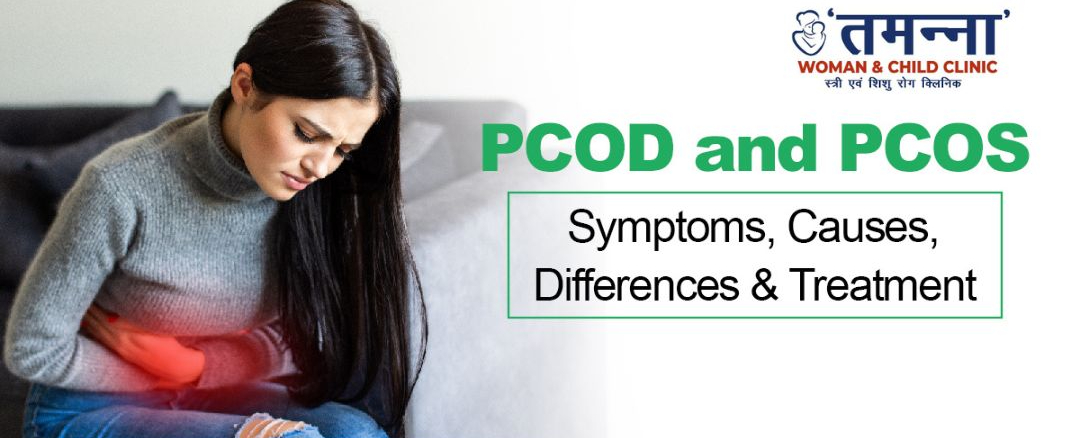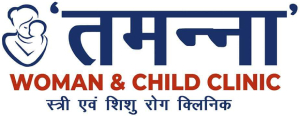Treatment of PCOS/PCOD by Best Gynecologist & Obstetrician in Raipur

What is PCOS?
Why does PCOD/PCOS affect women?
Hormonal Imbalance
This disrupts the balance of hormones such as estrogen, progesterone, and androgens (like testosterone) in the body. This imbalance can lead to irregular menstrual cycles and difficulties with ovulation.
Insulin Resistance
Many women with PCOS/ PCOD have insulin resistance, where the body's cells don't respond efficiently to insulin, a hormone that regulates blood sugar levels. This can lead to higher levels of insulin in the blood, which in turn can increase androgen production.
Genetic Factors
There is a genetic component to PCOS, meaning it tends to run in families. If someone in your family has PCOS, you may be more likely to develop it.
Lifestyle Factors
Poor diet, lack of exercise, and obesity can contribute to the development and worsening of PCOS/ PCOD symptoms. Managing a healthy weight with a balanced diet and regular exercise can aid in controlling PCOS/ PCOD and improve the outcomes of PCOD
Symptoms and Impact
PCOS can cause a range of symptoms including irregular periods, excess facial and body hair (hirsutism), acne, and hair thinning or loss. The severity of these symptoms can differ among women.
Diagnosis and Treatment
Diagnosis of PCOS/ PCOD involves a combination of symptoms, physical exams, and tests like blood tests and ultrasound. Treatment may include lifestyle changes, medications to regulate hormones and insulin levels, and sometimes fertility treatments if pregnancy is desired. Expert guidance for PCOD Treatment in Raipur can help control symptoms and restore hormonal balance effectively.
Common symptoms of PCOD/PCOS
Gynecologist & Obstetrician in Raipur, specializes in helping women manage PCOS effectively through personalized care and treatment plans tailored to their needs.
Here are the common symptoms of PCOS/ PCOD explained in simple terms:Irregular Menstrual Cycles: One of the primary signs of PCOS/ PCOD is irregular periods. This means periods may come late, early, or sometimes not at all, making it difficult to predict when menstruation will occur.
Excess Hair Growth: PCOS/ PCOD can cause hirsutism, where women develop excess hair on the face, chest, back, or other areas where men typically grow hair. This can be upsetting for numerous women.
Acne: Hormonal changes in PCOS/ PCOD can lead to increased acne, particularly on the face, chest, and upper back. This acne can be stubborn and may not respond well to typical treatments.
Weight Gain: Many women with PCOS/ PCOD experience challenges in managing weight or find it hard to shed pounds. This is often due to insulin resistance, where the body has trouble using insulin effectively.
Hair Thinning: PCOS can cause thinning of scalp hair or male-pattern baldness, which can be distressing and affect self-esteem.
Skin Darkening: Some women with PCOS/ PCOD may develop darkened patches of skin, particularly around the neck, groin, and under the breasts. This is called acanthosis nigricans.
Difficulty Getting Pregnant: PCOS is a leading cause of infertility Irregular Menstrual Cycles: One of the primary signs of PCOS/ PCOD is irregular periods. This means periods may come late, early, or sometimes not at all, making it difficult to predict when menstruation will occur.
Excess Hair Growth: PCOS/ PCOD can cause hirsutism, where women develop excess hair on the face, chest, back, or other areas where men typically grow hair. This can be upsetting for numerous women.
Acne: Hormonal changes in PCOS/ PCOD can lead to increased acne, particularly on the face, chest, and upper back. This acne can be stubborn and may not respond well to typical treatments.
Weight Gain: Many women with PCOS/ PCOD experience challenges in managing weight or find it hard to shed pounds. This is often due to insulin resistance, where the body has trouble using insulin effectively.
Hair Thinning: PCOS can cause thinning of scalp hair or male-pattern baldness, which can be distressing and affect self-esteem.
Skin Darkening: Some women with PCOS/ PCOD may develop darkened patches of skin, particularly around the neck, groin, and under the breasts. This is called acanthosis nigricans.
Difficulty Getting Pregnant: PCOS is a leading cause of infertility
Dr. Tammana Vinaik Agrawal, Best Obstetrician & Gynecologist in Raipur, specializes in diagnosing and treating PCOS/ PCOD. She helps women manage these symptoms through personalized treatment plans that may include lifestyle changes, medications to regulate hormones, and guidance on fertility issues. With appropriate care and advanced PCOD Treatment in Raipur, numerous ladies with PCOS can lead sound lives and accomplish their regenerative goals.
Weight and Height
These basic measurements show growth trends and can identify concerns like malnutrition or growth hormone deficiencies.
Head Circumference
This is especially important in infants to detect conditions that affect brain development.
Difference Between PCOS and PCOD
Definition:
- PCOS: PCOS, or Polycystic Ovary Syndrome, is a condition where women in their reproductive years have trouble with their hormones. This can cause irregular periods, too many male hormones called androgens, and sometimes ovaries with lots of small cysts.
- PCOD: PCOD, or Polycystic Ovary Disorder, is when a woman’s ovaries have many tiny cysts. These sores are little sacs filled with liquid. PCOD may or may not cause problems with hormones or other symptoms.
Symptoms:
- Women with PCOS might have irregular periods, extra hair growing in places like the face or chest where boys usually have hair, pimples, gaining weight, hair getting thinner, and sometimes, it’s hard to get pregnant.
PCOD is mostly known for the cysts on the ovaries. Other things like period problems and hormone issues can happen too, but not always. Hormonal Imbalances:This usually means having too much of the male hormone testosterone, which can cause hair to grow where it shouldn’t and make pimples.
Dr. Tammana Vinaik Agrawal, Best Obstetrician & Gynecologist in Raipur, specializes in diagnosing and treating PCOS/ PCOD. She helps women manage these symptoms through personalized treatment plans that may include lifestyle changes, medications to regulate hormones, and guidance on fertility issues. With appropriate care and advanced PCOD Treatment in Raipur, numerous ladies with PCOS can lead sound lives and accomplish their regenerative goals.
Diagnosis:
Doctors find out if someone has PCOS by looking at symptoms, checking the body, using an ultrasound to see the ovaries, and doing blood tests for hormones.
PCOD is found mostly with an ultrasound. Doctors look for lots of cysts on the ovaries. They may not need to do hormone tests unless there are other problems.
Treatment:
- Treatment for PCOS can include eating healthy, exercising, taking medicine to fix hormones, and sometimes, treatments to help get pregnant.
Treatment for PCOD focuses on fixing problems like period issues hair, pimples, gaining weight, hair getting thinner, and sometimes, it’s hard to get pregnant.
PCOD is mostly known for the cysts on the ovaries. Other things like period problems and hormone issues can happen too, but not always. Hormonal Imbalances:
This usually means having too much of the male hormone testosterone, which can cause hair to grow where it shouldn’t and make pimples.
Sometimes, PCOD doesn’t mess up hormones much besides making the cysts. It depends on the person.
Diagnosis:
Doctors find out if someone has PCOS by looking at symptoms, checking the body, using an ultrasound to see the ovaries, and doing blood tests for hormones.
PCOD is found mostly with an ultrasound. Doctors look for lots of cysts on the ovaries. They may not need to do hormone tests unless there are other problems.Treatment:
Treatment for PCOS can include eating healthy, exercising, taking medicine to fix hormones, and sometimes, treatments to help get pregnant.
Treatment for PCOD focuses on fixing problems like period issues and keeping an eye on the ovaries. Doctors might say to change the way someone lives, use medicine, or even do surgery if needed.
Treatment for PCOD
Treatment for Polycystic Ovary Disorder (PCOD) aims to help women manage their symptoms and improve their overall health. Here’s how doctors like Dr. Tammnna Vinaik Agrawal,
Treatment for Polycystic Ovary Disorder (PCOD) aims to help women manage their symptoms and improve their overall health. Here’s how doctors like Dr. Tammnna Vinaik Agrawal, Best Gynecologist & Obstetrician in Raipur, approach treating PCOD:
Healthy Lifestyle Changes: Dr. Tammana advises making healthy changes like exercising regularly and eating a balanced diet. These practices aid in sustaining a healthy weight and enhancing hormonal equilibrium in the body.
Medications: Depending on the symptoms a woman experiences, doctors may prescribe medications. These can help regulate menstrual cycles, lower levels of androgens (male hormones), and treat issues like acne and excess hair growth.
Routine Medical Examinations: It’s crucial to regularly see your physician for check-ups. These appointments allow doctors to monitor the health of the ovaries and hormone levels. Early detection of any issues helps adjust treatment plans and catch complications early.
Fertility Support: For women who want to have a baby, doctors may recommend treatments to help with ovulation. This can enhance the likelihood of conceiving.
Education and Support: Understanding PCOD is important for managing it well. Dr. Tammana provides information and support
to her patients, helping them learn about their condition and make informed decisions for their health.
Dr. Tammana Vinaik Agrawal, Best Gynecologist & Obstetrician in Raipur, specializes in providing personalized care to women with PCOD. Her goal is to help each patient feel better and live a healthier life by addressing their specific needs through effective PCOD Treatment in Raipur.
How is PCOD detected?
Detecting Polycystic Ovary Disorder (PCOD) involves different steps that help doctors understand what might be happening inside a woman’s body. Here’s how they find out if someone has PCOD: Talking About Your Health: The doctor will ask questions about your periods like if they are regular or not and other things like acne, extra hair growing where it shouldn’t, and if you’ve gained or lost weight. They might also ask if anyone else in your family has similar problems.
Checking Your Body: During a physical exam, the doctor might gently feel your belly to see if your ovaries feel normal or if any bumps could be cysts.
Using an Ultrasound Machine: Sometimes, the doctor uses a special machine called an ultrasound to look at your ovaries. For this procedure, a small probe is inserted into the vagina to capture images. This helps the doctor see if there are many tiny cysts on your ovaries, which is a sign of PCOD.
Blood Tests: You might need to give a little blood for tests. These
tests assess the concentrations of hormones such as testosterone, LH, FSH, and insulin in your body. High levels of testosterone and LH, or an odd ratio of FSH to LH, could mean you have PCOD. They might also check your insulin levels because PCOD can be linked to problems with insulin.
Extra Tests: Sometimes, the doctor might want more tests, like a glucose tolerance test to check for diabetes or a thyroid test to see if your thyroid gland is working right.
These steps help the doctor understand what’s going on inside your body and figure out the best way to help you feel better if you have PCOD. If experiencing PCOS/PCOD, book an appointment with Dr. Tammana Vinaik Agrawal in Raipur for the best care. She is one of the Best Gynecologist in Raipur offering specialized PCOD Treatment in Raipur for complete women’s wellness.
